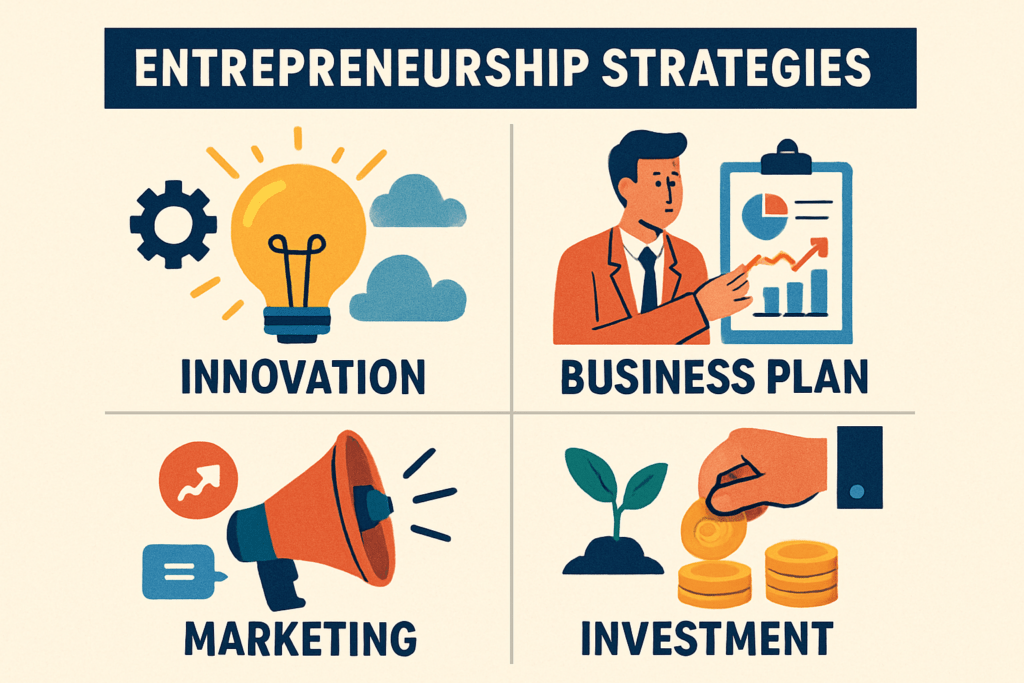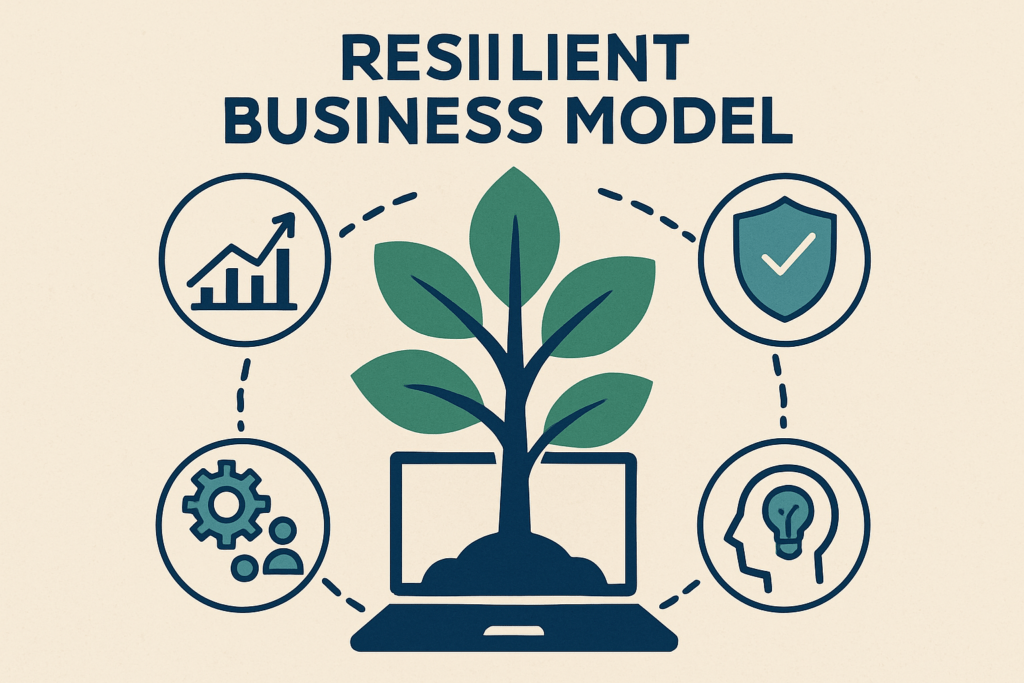Why Strategic Planning Matters in Entrepreneurship
- Introduce what strategic planning is and why it matters for startups and experienced entrepreneurs alike.
- Establish the article’s focus using the primary keyword: strategic planning entrepreneurship.
- Set an efficient, down-to-earth tone—success isn’t just about hustle; it’s about making smart moves.
Why Strategic Planning Matters in Entrepreneurship
Strategic planning is the process of figuring out where you want your business to go and mapping the smartest route to get there. For anyone in entrepreneurship—whether you’re launching your first startup or you’re a seasoned founder—strategic planning is the difference between constantly putting out fires and actually building something sustainable. Sure, the grind gets romanticized, but hustling in circles isn’t real progress. Smart entrepreneurs know that success isn’t just about outworking the competition; it’s about out-planning them. That’s where strategic planning entrepreneurship comes in. This article breaks down how thinking ahead—deliberately—gives you an edge, separates winners from wannabes, and turns your big ideas into grounded, achievable steps. No fluff, no fortune cookie advice. Just a practical primer on why smart planning is the best tool in any entrepreneur’s arsenal.
What Happens After Winning Millions?
Winning a life-changing lottery jackpot is every player’s dream, but few are prepared for what comes next. While the sudden influx of wealth can bring excitement, it also poses a wave of challenges.
Financial Decisions and Challenges
Many winners find themselves overwhelmed by financial decisions:
- Tax Management: Understanding and paying applicable taxes is crucial.
- Investment Choices: Making smart investments to secure the future is key.
- Hiring Financial Advisors: Some winners opt for professional advice to manage their wealth.
- Avoiding Reckless Spending: Impulsive expenditures can lead to rapid financial decline.
Without proper planning, the dream of endless riches can quickly turn into a financial nightmare.
Lifestyle Changes
Winning a lottery can lead to significant lifestyle transformations:
- Acquisitions: Luxury homes, exotic cars, and extravagant vacations become reality.
- Social Dynamics: Friends and distant relatives often emerge, hoping for a share of the winnings. This can create tension and difficult decisions.
- Living Low-Profile: Some winners choose discretion over display to avoid the pressure and attention that come with sudden wealth.
Adjusting to new realities is rarely as simple as it seems, whether embracing luxury or choosing discretion.
Philanthropy and Legacy
For many, newfound wealth becomes an opportunity to effect positive change:
- Charitable Efforts: Winners often make impactful donations and fund community projects.
- Business Investments: Some focus on creating businesses or revitalizing towns.
- Creating a Legacy: Contributions to society such as scholarships or launching nonprofits can leave an enduring impact.
The stories of winners range from tales of financial downfall to those of transformative community contributions, illustrating that the handling of newfound riches shapes not just personal futures but also legacies.
Why You Can’t Afford to Wing It (Especially with a New Venture)
Here’s the unvarnished truth: winging it might work for a jam session or a weekend road trip, but entrepreneurship? That‘s a much bigger stage, with far higher stakes. Every successful startup graveyard is littered with the remains of “good ideas” that got sunk by poor—or absent—planning. When you skip strategic planning, you’re not just gambling with money. You’re risking time, morale, and your team’s trust.
Wasted resources are just the start. Imagine building a product that nobody wants, spinning your wheels on irrelevant features, or burning your budget chasing the wrong customers. Without a roadmap, teams drift. People work hard but in different directions, creating chaos instead of momentum. Meanwhile, missed opportunities pile up—not because the market wasn’t there, but because you didn’t have the foresight or structure to pivot.
That’s where entrepreneurial foresight comes into play. Strategic planning isn’t only about preparing for what you expect; it’s about setting up safety nets for the curveballs you can’t see coming. A solid plan highlights risks before they become existential threats. When supply chains falter, regulations shift overnight, or a competitor launches a surprise move, your structured plan means you’ve factored in the “what ifs,” not just the “what nows.”
Bottom line? If your default mode is improvisation, you’re stacking the odds against yourself. Strategic planning carves out space to dodge bullets before they’re fired and to seize good luck when it lands. Tighten your game—winging it is for amateurs.
Key Elements of Strategic Planning for Entrepreneurs
You don’t need an MBA to build a solid strategy—but you do need more than wild guesses. Good strategic planning is built on a handful of core elements, no matter your industry or how new you are to the game.
Start with real market research. Who are your competitors? What do your customers actually want—today and tomorrow? Skip the guesswork; use data. Next, set clear objectives. “Grow sales” is vague. “Land 20 new B2B clients in 6 months” is a real target.
Now comes SWOT analysis. Take a hard, honest look at your strengths, weaknesses, opportunities, and threats. Brutal truth up front beats wishful thinking later. From there, outline measurable targets. These give you something to aim for and a way to know if you’re making progress or just treading water.
But don’t marry your plan. The strongest entrepreneurs keep their strategy flexible with regular feedback loops. Check your progress monthly or quarterly. What’s working? Where are you missing the mark? Use these check-ins to fine-tune your plan, rather than stubbornly following something that’s gone off track.
Key pieces of a strong entrepreneurial plan:
- Clear vision and mission
- Targeted market research
- Realistic, measurable goals
- SWOT analysis
- Defined tactics and responsibilities
- Milestones and metrics to track progress
- Recurring review and adjustment sessions
Bottom line: Strategic planning for entrepreneurs boils down to knowing where you want to go, why you want to go there, and how you’ll measure the journey—without being afraid to reroute when conditions change.
Digital Tools & Resources to Supercharge Your Strategy
Forget whiteboards full of scribbles. These days, most of the heavy lifting in strategic planning entrepreneurship happens online, fast, and with way more precision. Entrepreneurs are spoiled for choice when it comes to digital tools that can turn planning from a headache into a habit.
Start simple: Trello and Asana help you break big dreams into bite-sized, trackable tasks. Notion and ClickUp kick it up a notch, letting you blend planning docs, project management, and knowledge bases all in one place. For number crunching and goal-setting, Lean Canvas or LivePlan walk you step-by-step through the business model and financial projections—without needing an MBA.
Worried your plan might go stale? Google Workspace or Microsoft 365 keep your team in sync as you update, share, and adjust documents in real time. Market research doesn’t have to mean days buried in data—tools like SEMrush, Statista, or even just Google Trends offer a quick lay of the land.
Templates are a time saver. You’ll find everything from SWOT analyses to milestone trackers online—many free, some worth paying for. And don’t sleep on mentorship: platforms like SCORE, GrowthMentor, or even select subreddits get you seasoned feedback fast (and sometimes for free).
Curious which to use, or want more specifics? Check out this detailed guide—digital tools for entrepreneurial success. Bottom line: digital tools aren’t bells and whistles. They’re the tactical gear every modern entrepreneur should be using to keep their strategic planning sharp, collaborative, and actually actionable.
Strategic Planning in Action: Founder Stories and Famous Pivots
Let’s drop the theory and talk about what actually happens on the ground. Legendary startups didn’t hit it big by winging it; they made—and remade—plans. Take Netflix. In the DVD era, Reed Hastings didn’t just rent discs—he saw streaming coming and adjusted, hard. Netflix’s pivot from mail-order business to full-blown digital platform didn’t happen overnight but through a deliberate, evolving strategy. The company’s ability to anticipate trends and steer through uncertainty is textbook entrepreneurial planning.
Or look at Slack. Originally, the team was building an online game called Glitch. When that fizzled, founder Stewart Butterfield didn’t waste the lessons—they noticed the internal chat tool their team used could be a product. Cue a sharp, strategic pivot, and now Slack is everywhere. The message: it’s not just about having a plan, but being ruthless about what works and what doesn’t. Strategic planning gives you room to redirect before your ship sinks.
That’s the raw truth—behind every “overnight success” is a founder who put in the hours mapping out the path, then wasn’t afraid to redraw the map when needed. Real-life lesson? Treat your business plan like a compass, not a cage.
What Happens After Winning Millions?
Winning a life-changing lottery jackpot is an exhilarating dream, but few are prepared for what ensues. While the prospect of immense wealth brings excitement, it simultaneously introduces a wave of challenges that can be overwhelming. Here’s a closer look at the reality many winners face:
The Financial Reality of Winning
Winning the lottery quickly ushers in significant financial responsibilities. Winners often grapple with immediate concerns such as:
- Tax Obligations
- A large portion of the winnings can be lost to taxes, and poor planning might lead to legal hurdles.
- Investment Decisions
- Choosing between hiring seasoned financial advisors for investment guidance or risk falling into the trap of reckless spending is crucial.
- Long-term Financial Stability
- Budgeting and financial planning are essential to prevent a rapid depletion of newfound wealth.
A Lifestyle Overhaul
Experiencing a substantial windfall opens the door to drastic lifestyle changes and unique challenges, such as:
- Luxury Acquisitions
- Winners often indulge in purchasing things like mansions, luxury cars, and lavish vacations.
- Social Dynamics
- The emergence of distant relatives and old friends seeking financial help can create tension.
- Privacy Concerns
- Navigating the incessant media attention and public scrutiny becomes a newfound reality for many.
While some winners revel in opulence, others opt for a low-profile existence to elude the spotlight and pressures that accompany wealth.
Giving Back and Creating a Legacy
For a number of winners, newfound wealth becomes an opportunity to contribute to society:
- Charity and Philanthropy
- Some choose to make substantial charitable donations or initiate community projects.
- Supporting Education
- Funding scholarships and educational programs becomes a priority for many.
- Economic Contributions
- Investment in business ventures that foster job creation is a common choice.
Lottery winners can either create meaningful legacies or face financial decline. Those who manage their wealth effectively often transition from lucky winners to impactful philanthropists.
Takeaway: Planning is the Smart Entrepreneur’s Secret Weapon
Here’s the no-frills truth: in entrepreneurship, smart beats scrappy every time. Strategic planning isn’t some corporate luxury—it’s your playbook for survival and growth. Skipping it means gambling with your time, energy, and bank account. Whether you’re launching a startup or scaling up, betting on hustle alone won’t cut it. You need a working blueprint, a system to check your progress, and the guts to tweak your moves when data says so.
So remember: plan with intent, check your direction often, adapt fast, and repeat. This is the real secret to building something that lasts. Brains and blueprints win the game—brute force just wears you out. Plan smart, and give your business its best shot.



